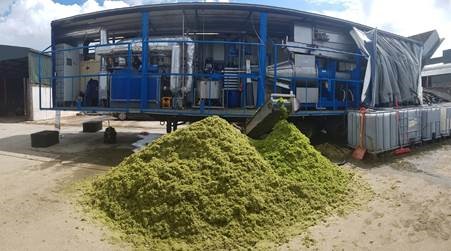Biorefinery Glas
Demonstration of a small-scale grass biorefinery with farmers in South West Ireland to diversify farmer produce while resolving significant challenges in traditional agriculture
Biorefinery Glas in South West Ireland explored an option of improving the sustainability, value and resource efficiency of Ireland’s livestock sector by supporting farmer diversification into the bioeconomy. The biorefinery process involves fresh grass that can be processed to produce a solid fraction presscake fibre feed for ruminants and a liquid green fraction protein concentrate that can serve as monogastric feed. In addition, a high-value sugar stream, in the form of a prebiotic, can be extracted from the remaining liquid, leaving a residual stream called “whey” biofertiliser which contains many nutrients, minerals and sugars.
Field trials have demonstrated the effectiveness of whey biofertiliser in promoting grass growth and enhancing its quality compared to traditional slurry applications. The dried and pelletised protein-rich liquid grass juice can be used to supplement pig diets, resulting in improved feed intake and weight gain while reducing reliance on imported soy feed. Additionally, the project evaluated press cake silage from the biorefinery as cattle feed, showing potential for reduced emissions and improved nutrient utilisation efficiency. Ultimately, the farmer-led bioeconomy model aims to enhance overall farm efficiency by producing multiple co-products, including green protein concentrate, prebiotics for animal nutrition, and biofertiliser or biogas from residual fractions, thus contributing to sustainable agricultural practices and resource utilisation.
